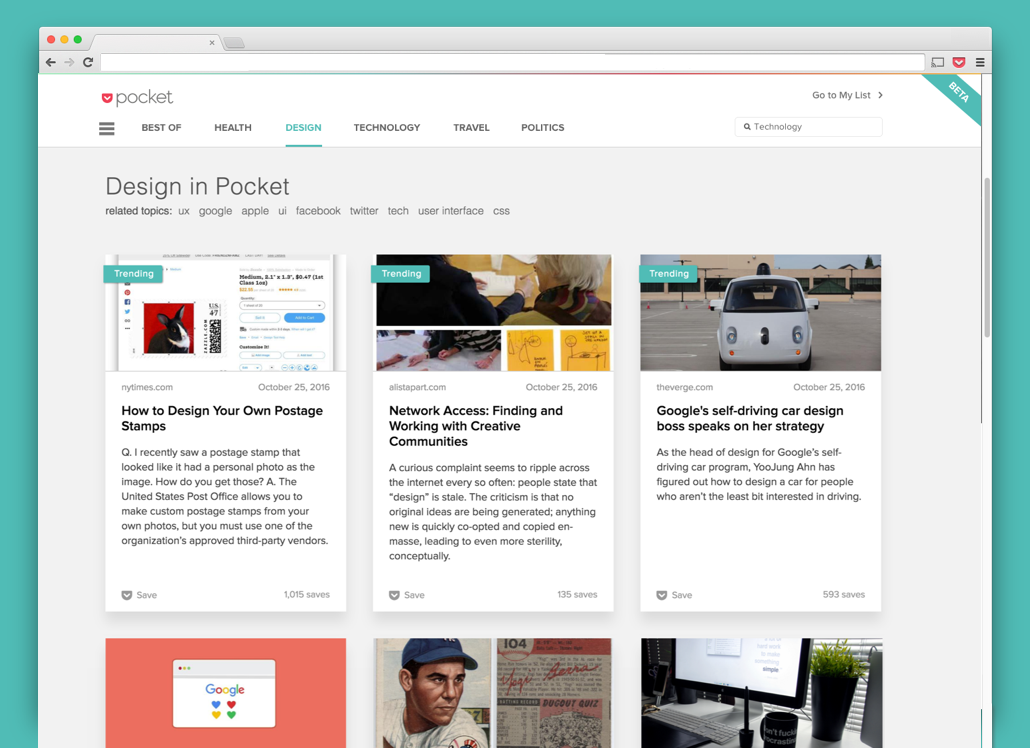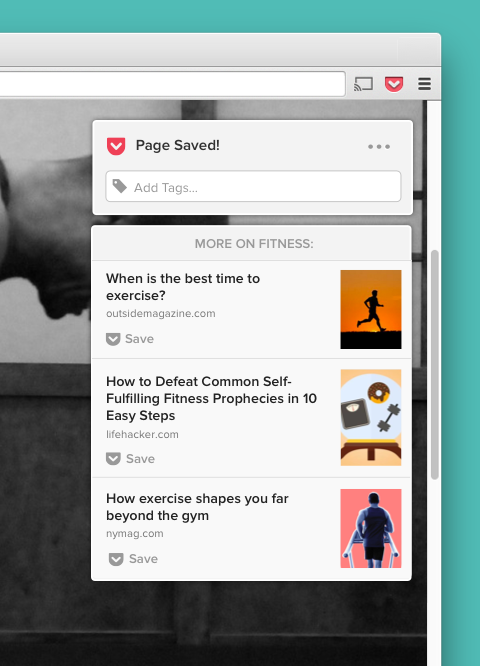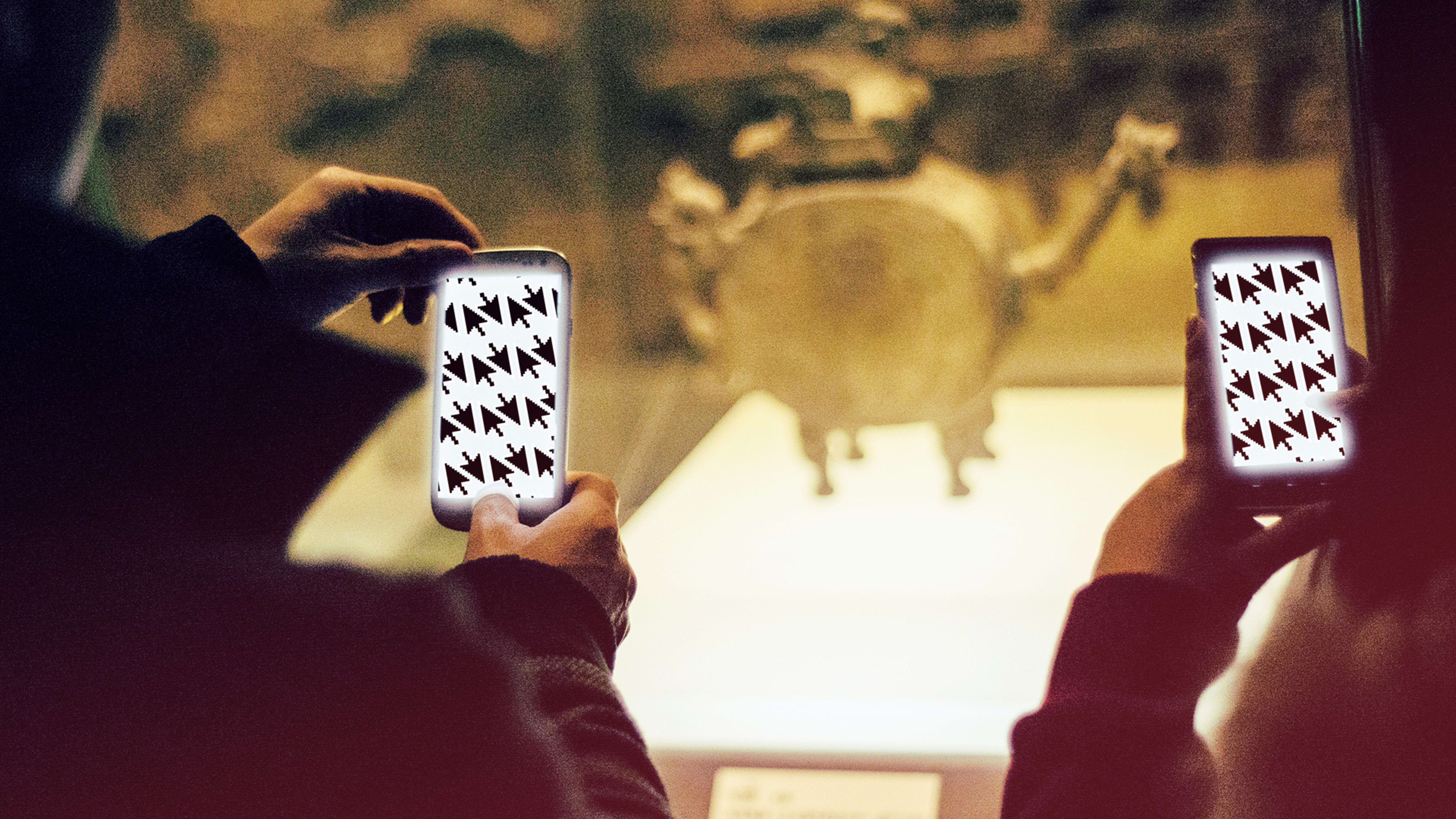Gathering good reading material from around the internet is hard. You can’t trust your friends on Facebook. Twitter is too noisy. And even if you’re a master of RSS, you probably spend too much time sorting through filler.
This is where Pocket hopes it can make a difference. For the last nine years, the company–originally called Read It Later–has essentially run a glorified bookmark service, letting people save articles into a slick reading view on mobile devices and the web. To date, Pocket’s 25 million registered users have stashed more than 3 billion links for later perusal.
Now, Pocket is turning all those saved stories into recommendations, helping people find reading material regardless of whether they do any bookmarking themselves. The idea is that any article worth saving is inherently more substantial than your average Facebook or Twitter link. Pocket wants to make itself a destination for those stories that dig deeper than the day’s headlines.
“Once we have the save platform, and we have millions of people that are basically hand curating the web for us, we can build out really high-quality recommendations, and are able to power a better version of the web, so to speak,” says Nate Weiner, Pocket’s founder and CEO.
Deeper Dives
Pocket has been dabbling in recommendations since last year, but only as a way to help active bookmarkers find related articles. As of this week, it’s opening up those recommendations to a larger audience. Visit the Pocket website (and, in the coming months, the Pocket app), and you can browse through topics like Technology, Food, and Fitness. To stock each section, Pocket looks at how many people have saved each link, and how engaged they’ve been with the text.

“Because the consumption happens within Pocket, we actually get to see how far people scroll, how much time they spend, if they share it or don’t,” Weiner says. “So we can go beyond what’s popular, and actually add what’s good, what people are actually spending time with.”
There are no boundaries on the topics Pocket can include, either. Instead of curating each section by hand, Pocket generates topic pages automatically from users’ tags and its own scanning algorithms. That means you can search for specific concepts such as “self-driving cars” or “natural gas pipelines,” and get suggestions on related topics as you scroll through each section.
“There’s an ongoing debate between whether curation should be humans curating and editorializing things or algorithms, and there’s a big divide between those two,” Weiner says. “For us, we actually think they’re both wrong as a black-and-white thing. There needs to be a middle ground, and that’s what’s unique about Pocket.”
The company is also stuffing more recommendations into its Chrome extension that lets active users easily save links from a web browser. The extension now brings a few suggested articles onto Chrome’s new tab page, and shows a few related articles whenever users save a link.
These new initiatives are a big part of Pocket’s business plan. Earlier this year, the company started experimenting with sponsored posts in its apps and website. By opening up recommendations, Pocket hopes to draw more eyeballs, and Weiner expects that in the long run, sponsored posts will comprise 80% of the company’s revenue. (Users can avoid those sponsored posts with a $5 per month subscription, which also includes extra features for saving and sorting through links.)
For Weiner, the plan comes as something of a relief. After turning down an acquisition offer from Evernote five years ago, he largely put money making on hold, instead raising $15 million in venture capital. Though he doesn’t rule out an acquisition by the right partner, he views the business plan as a path to independence. (Longtime rival Instapaper was snapped up by Pinterest in August.)
“I’m super pumped to be ramping our revenue again, and putting us on the trajectory for being pretty close to break-even next year,” he says.
The Ethics Of A Better Web
Solid as that plan may seem, Pocket still has some issues to work on.
One ongoing challenge will be to make sure that Pocket’s active users keep saving a steady flow of links. Weiner also acknowledges that users tend to get overwhelmed by all the links they’ve collected, so in the future, Pocket wants to add more ways for users to sift through their existing bookmarks.
“We still have that noise problem, even within our own product,” he says. “But a big part of what we want to do is take all this insight and data that we have, and be able to help you to filter, and prioritize, and get through what you’ve saved, and power that up.”

As Pocket grows, it may also have to do some deep thinking about its own mission. As a destination for other publications’ written work, the risk is that Pocket could drive people away from publishers’ websites, reducing their own ability to sell ads. The company, then, has some obligation to ensure there’s enough quality content to begin with.
Weiner contends that Pocket isn’t depriving publishers of eyeballs, at least not directly. Clicking on a link in the new recommendations section still takes you to the actual web page, he says, rather than Pocket’s reading view. (This is only partially true; you can also click a “Save to Pocket” button to bypass the web view entirely.)
But if Pocket gets big enough, publishers might also see it as an opportunity. One thing the company is exploring now is the ability to include its recommendations directly on publishers’ websites–sort of like a highbrow version of Outbrain or Taboola, content networks whose stories skew to material of the “Donald Trump’s Most Scandalous Love Conquests” ilk. Weiner says it’s early days for this effort, but one could imagine sponsored content being lucrative for both publishers and Pocket in that context.
Weiner also hasn’t completely ruled out a consumer-facing subscription model that shares revenue with publishers. While he’s a bit skeptical that people will pay for text content in the first place, he does believe a large-scale service that spanned many publishers would be the best place for that type of model.
“It’s something we think could potentially work, but would require us to really get a lot of things right,” he says. “I wouldn’t count it out, but it’s still a big question mark.”
Serving as the web’s curator also brings up a knottier question about the type of material that’s being curated. Pocket’s current user base tends to be politically left-leaning, a point that becomes clear while perusing some sections of the website. As we’ve seen with Facebook, the danger with algorithmic curation is that it can trap users in hyperpartisan bubbles that only get harder to break over time.
Weiner says he and his team think about this issue often, though the solutions aren’t clear cut. It’s possible that Pocket could weigh its algorithms differently or serve more recommendations that fall outside of a particular user’s comfort zone–the same way Spotify occasionally does with its weekly playlist suggestions.
In any case, breaking people’s ideological bubbles is something Pocket will need to figure out if it wants to stay true to its ethos of building a more informative web–and Weiner knows it.
“We want to expose you to unique perspectives and things you wouldn’t see otherwise,” he says. “It’s definitely in line with the things that we want to accomplish.”
Recognize your brand’s excellence by applying to this year’s Brands That Matter Awards before the early-rate deadline, May 3.
